The percentage of parents of university teachers who have a doctorate degree is 25 times that of the general public

Research has shown
The Wealth Gap in Science: How Your Parents's Income Affects Your Career-YouTube
This issue was taken up by Science Discussed, a science YouTube channel operated by Dr. David Broadway, a physicist at the University of Basel, Switzerland.

Socio-economic status is the number one indicator of a candidate's ability to become a science professor. For example, the probability that professor's parents have a doctorate is 25 times higher than the general public. This trend has been going on for decades and seems to be getting stronger in recent years.
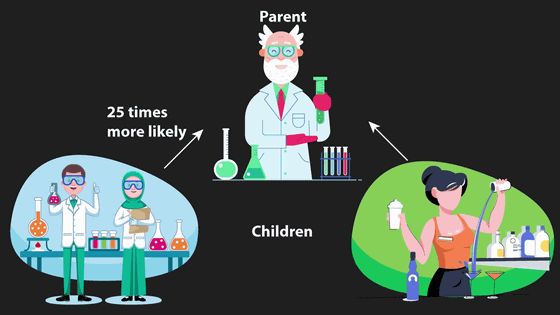
'Science should all be a domain of aptitude. To become a professor, you must have the ability to be a scientist, the ability to teach as a teacher, and the qualities to be a leader. It should not be related to your parents' income or educational level. said Mr Broadway.
However, unfortunately this is not the case, as shown in the paper 'Socioeconomic roots of academic faculty' published in Nature Human Behavior.
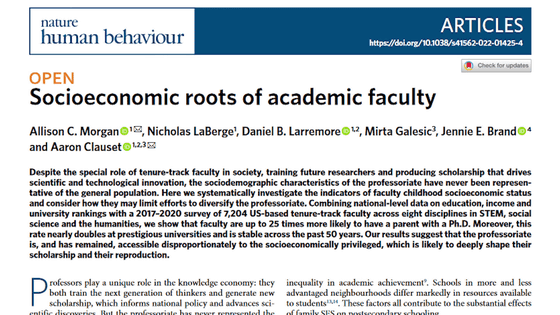
The paper is kore.
Socioeconomic roots of academic faculty | Nature Human Behavior

According to the survey, 22.1% of university teachers answered that at least one of their parents had a doctorate degree, and more than half of them answered that the condition was lowered to a doctorate or master's degree. Comparing this with the general public of the same age group, less than 1% of either parent had a doctorate, and 7.4% of ``parents have some kind of degree''.

In other words, compared to the general public, the parents of university teachers were 25 times more likely to have a Ph.D. and 4.5 times more likely to have a parent with a master's degree.
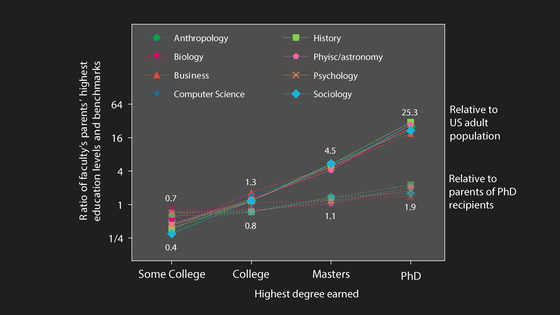
For that reason, Mr. Broadway said that various things are intricately intertwined. For example, insider information and nepotism within the school may play an important role in promotion within the school. But this reasoning ignores the economic factor.
Second, research has shown that university faculty, on average, come from well-to-do families. This means that children from wealthy families can go to more expensive schools and go on to better universities.
In the graph below, the horizontal axis shows income and the vertical axis shows the number of people, brown shows the university teacher's family, black shows all the addresses. The vertical line indicates the median value, and the median value for university teacher households is higher than the median value for all households.
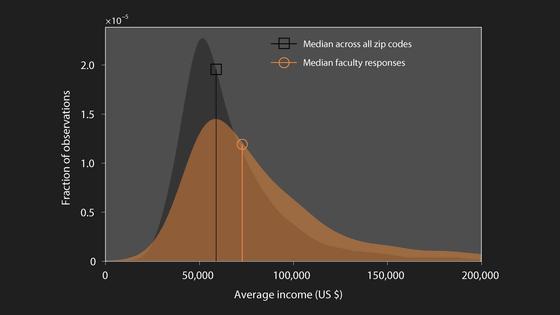
Prior research has found that students who have completed a degree at a higher education institution are more likely to come from the top 1% of the income distribution in the United States.
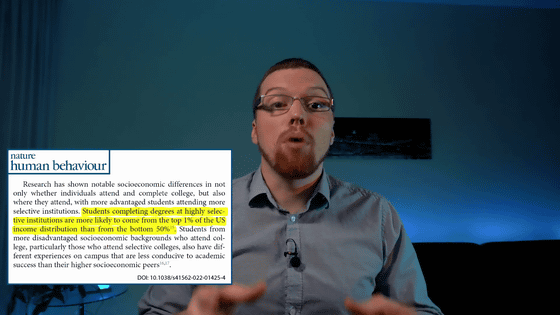
We also know that the number of students who obtain PhDs is higher among students whose parents have PhDs. Undergraduate and graduate students' repetition is known to be correlated with the degree of family support, and students who are paid by their parents are more likely to advance to doctoral programs.
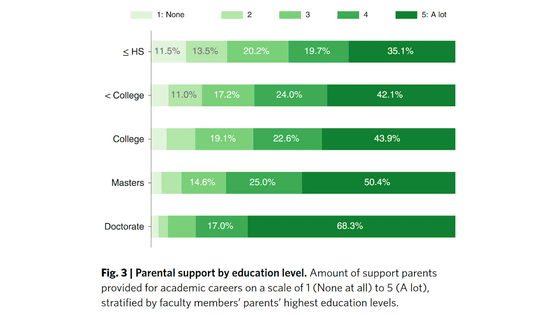
What Mr. Broadway raised as a point of concern is whether there is a gender difference. Below, the vertical axis shows the ratio of university teachers whose parents are university graduates, and the horizontal axis shows the year of birth of university teachers. In the generation born in the 1940s, women were about 10 points higher, but the difference was is steadily shrinking, and it can be said that it is almost within the margin of error after the generation born in 1970. In the past, women were more likely to have college-educated parents, said Broadway. because it was,” he said.
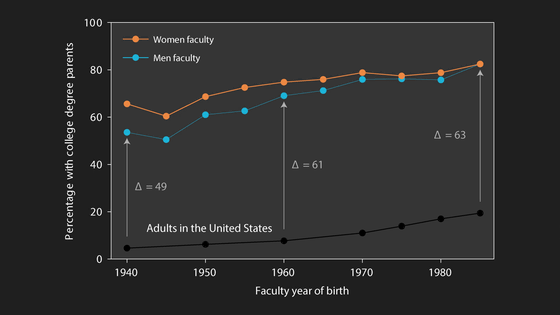
However, Broadway added that the elimination of this numerical difference did not mean that everything was even, just that this special advantage was no longer differentiated.
Next, Mr. Broadway took up how racial diversity affects us. ``The problem is that if the highest educational attainment of parents is a good indicator of academic success, the black and Hispanic communities remain underrepresented,'' Broadway said. In fact, fewer than 1% of black or Hispanic parents had PhDs, compared to about 2% of whites and about 5% of Asians.
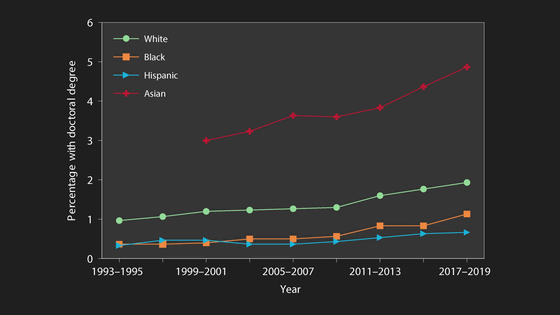
Next is the prestige of the university. 13% of faculty members born in the 1940s and 26% of those born in the 1980s have a parent with a doctorate. And the top 20 schools consistently maintain higher than average percentages.
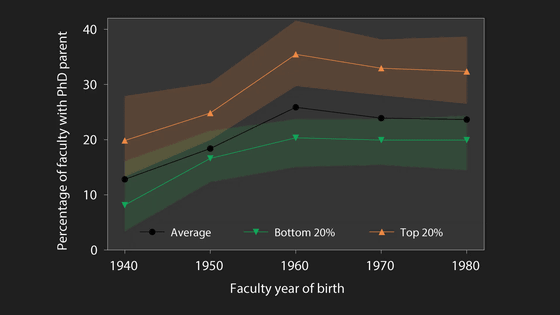
This is also shown in the data, the more prestigious the university, the higher the percentage of teachers whose parents have PhDs. In other words, Mr. Broadway pointed out that there is a possibility that a problem that goes against science may occur, such as selecting teachers from among fewer candidates than prestigious universities.
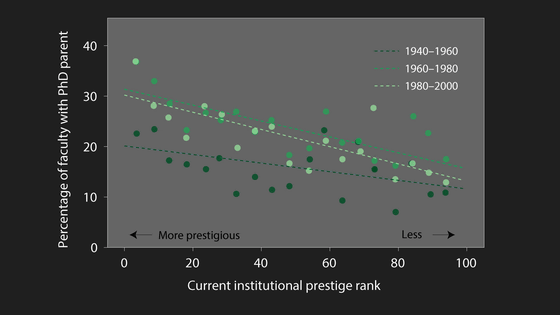
It is also clear that having a parent with a PhD increases the chances of becoming a university teacher by nearly 10%. Parents with PhDs tend to have higher incomes, so we can conclude that having a parent with a PhD is a strong indicator of success.

However, because there was no survey of people who quit university teaching before the start of this study, it is not possible to show how sexism, racism, and class discrimination affect the intention to continue education. Limitations of the study were also pointed out.
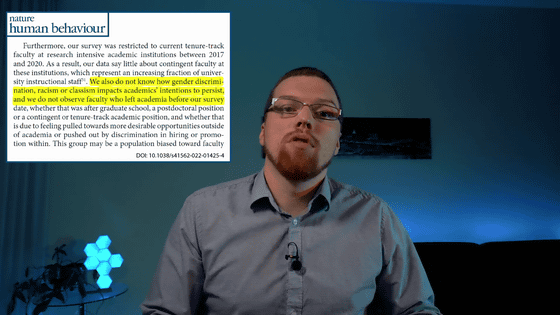
And while this study examines ``the impact of socioeconomic status on being a university teacher,'' it does not show ``the social and occupational difficulties experienced by those of lower social status.'' For example, women are less likely to be considered competent, less likely to be awarded for their research, less likely to be invited to speak, less likely to receive fair compensation, and similarly black faculty members are less likely to be productive. Earnings may be low and research may be undervalued, even though there is no measurable difference.
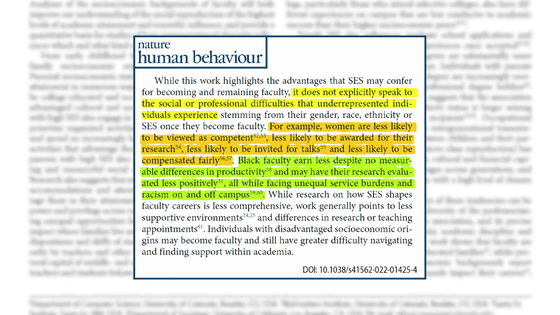
Mr. Broadway criticized the world of science as having the same implicit biases as any other workplace, leading to a lack of diversity. This is what is important, and argues that diversity is necessary for that. He hoped that considering all aspects of diversity, such as gender, race, socioeconomic status, and national origin, when recruiting new faculty would maximize diversity and minimize such prejudices. . Finally, Mr. Bradway concluded, 'Science always adapts to new ways of thinking.'

Related Posts:
in Video, Posted by logc_nt







